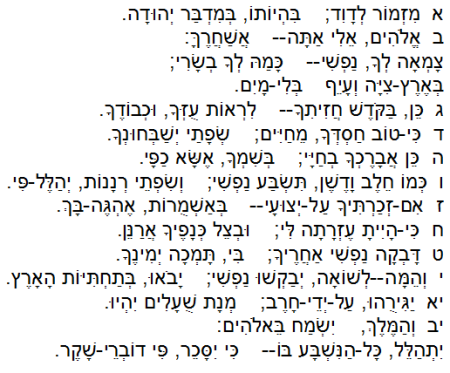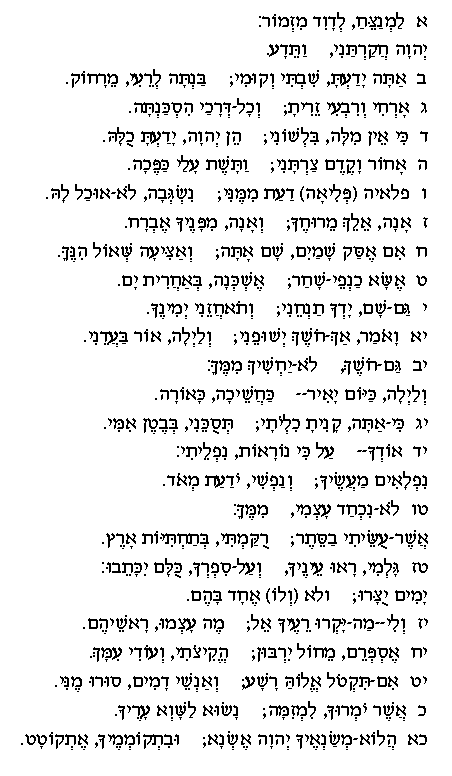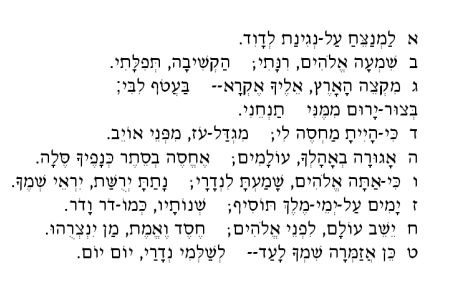Psalm 63
A Psalm of David, when he was in the wilderness of Judah.
O God, you are my Creator; earnestly I seek you;
my soul thirsts for you;
my flesh faints for you,
as in a dry and weary land where there is no water.
2 So I have looked upon you in the sanctuary,
beholding your power and glory.
3 Because your steadfast love is better than life,
my lips will praise you.
4 So I will bless you as long as I live;
in your name I will lift up my hands.
5 My soul will be satisfied as with fat and rich food,
and my mouth will praise you with joyful lips,
6 when I remember you upon my bed,
and meditate on you in the watches of the night;
7 for you have been my help,
and in the shadow of your wings I will sing for joy.
8 My soul clings to you;
your right hand upholds me.
9 But those who seek to destroy my life
shall go down into the depths of the earth;
10 they shall be given over to the power of the sword;
they shall be a portion for jackals.
11 But the king shall rejoice in the Creator;
all who swear by him shall exult,
for the mouths of liars will be stopped.
We see here that even a person who already very much yearns to be in bestowal, to identify with the force of bestowal, to come closer to the concept called “God,” to discover it within himself, that it does not take place all at once.
In other words, to what extent do we need to continually refine the yearning, the desire, the restriction, the screen, the reflected light, in order to be a “sanctuary” – “my soul thirsts for you”? If a person reaches vessels that are holy, in absolute bestowal – either bestowal in order to bestow or receiving in order to bestow – if he sees that holiness, then it is only possible as a result of the person preparing his vessels to be as such, in absolute bestowal.
We need to always remember that we speak about the Creator’s revelation (i.e. the revelation of the quality of bestowal and love) within the person.
“My soul thirsts for you” relates to one who yearns “When will it come?” Revelation means to reach, in the person’s correction, bestowal and giving. In other words, the desire to receive and for the revelation of the Creator is always in terms of the holy language, the language of bestowal, and not the language of reception. One aimed in such a direction asks: “Will I reach the state where my vessels will be corrected enough for revelation?” Revelation of the Creator is the quality of bestowal that I can pass to Him.
“Beholding your power and glory.” If we would see that “power and glory” mentioned, it would be the greatest darkness, because it is the quality of bestowal, and who needs that? However, in that he saw that he did not yet reach its end, he increases in strength and sensitivity.
Refining the quality of bestowal is that one is in that state of bestowal but has not yet attuned oneself completely to it. It is like tuning a radio and hearing the desired station, but not entirely clearly, and fine tuning it so that the frequency of the receiver is exactly the same as the frequency of the signal. It is the same here: he is fine tuning his vessel to precisely match the signal of bestowal.
What is the meaning of “the revelation of the Creator”? What does it mean that the Creator is a quality of bestowal? How can one fine tune oneself to this quality of bestowal and love? All these questions and more are dealt with in the Free Kabbalah Course, which provides the fundamental principles and tools by which to correctly approach the wisdom of Kabbalah. It is recommended to take the Free Kabbalah Course before approaching the Daily Kabbalah Lessons with Dr. Michael Laitman. Click the banner below to sign up…



